A total of 18 countries filed documents Wednesday ratifying a UN treaty to regulate the $80-billion-a-year conventional arms trade.
One year after the Arms Trade Treaty was adopted by the General Assembly, 31 countries have ratified it.
The treaty will take effect once 50 UN member states ratify it. So far, 118 countries have signed it.
“It is fair to say that at the current pace of signature and ratification, the ATT could well enter into force in the second half of this year,” said Virginia Gamba, deputy to the UN high representative for disarmament affairs.
The 18 countries to file their ratifications during a ceremony at UN headquarters in New York were all members of the European Union except for El Salvador. among the EU members submitting documents were Germany, France and Great Britain.
The treaty aims to force countries to set up national controls on arms exports. States must assess whether a weapon could be used to circumvent an international embargo, be used for genocide and war crimes or be used by terrorists and organized crime.
The first major arms accord since the 1996 Comprehensive Nuclear Test Ban Treaty, the ATT covers international transfers of everything from tanks to combat aircraft to missiles, as well as small arms.
The United States — which is the world’s biggest arms producer — signed the treaty only after a regulation on ammunitions was dealt with separately, providing for less comprehensive controls. Meanwhile Russia expressed reservations over the criteria used to authorize transactions.
A UN statement Wednesday said secretary-general Ban Ki-moon “calls on all states that have not yet done so to sign and/or ratify the ATT without delay.”
Anna Macdonald, a representative from the NGO Control Arms, said that “nowhere is the need for an effective treaty more apparent than in the devastating humanitarian crisis in Syria.”
The conflict there, she said, “has been fueled by transfers of arms and ammunitions from outside parties.”










